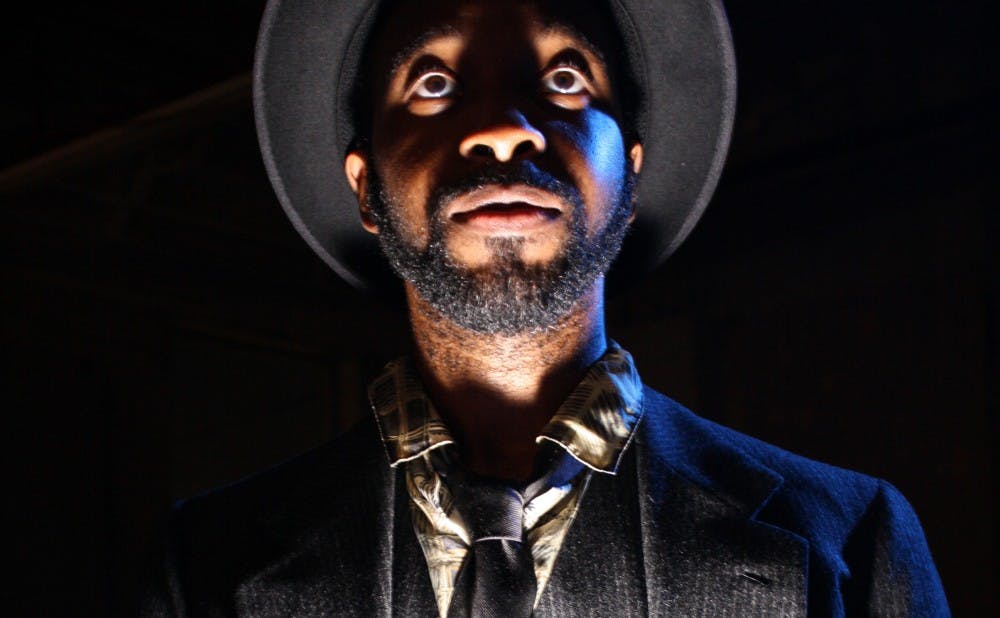You're on Foster Street, just outside Trotter Building. You peek through the windows of the converted gymnasium on Thursday morning, opening day of Little Green Pig Theatrical Concern's eighth season starter, Thornton Wilder's Pulitzer-winner “Our Town.” Inside, you see some off-white paper lantern lights. A few black umbrellas hanging on old radiators. Costumes. A bike. You ain't seen nothing yet.
A couple of ladders. A single row of seats arranged in an oval around the hardwood floor. No props—not much in the way of set. Just chairs. What you see isn't the 1901 fictional “Our Town” locale of Grover's Corners. Right now, this is just Foster Street, Durham, 2013.
Fast forward to 8 p.m. that night. Lights up. You see the audience encircling the space. Suddenly, in marches the energetic ensemble of players, dressed as an eclectic troupe of performers, singing the old folk spiritual "Yonder Comes Day" and hauling all manners of instrumentation. Tambourines. A trumpet. Written on the bass drum is the name of the band, "Grover's Corners Brass Band: Weddings And Funerals."
If you've seen “Our Town“ before, you'll probably note something unusual about the production as soon as the players roll in from offstage. All the actors are African American. The play, which captures small-town life in rural New Hampshire during the early 20th century, is traditionally understood as a time capsule of white American life. So the choice to cast all black actors is by all accounts incredibly refreshing.
With that in mind, the specific setting of Little Green Pig's production is meant to be fluid and cross-cultural. At times, you are unmistakably transported to Main Street, Grover's Corners. At others, the ensemble channels Durham's Parrish Street (a.k.a. “The Black Wall Street”), in the era when the Hayti district was alive and kicking at the turn of the century. These are active directorial choices. The cast communicates a sense of a "traveling band" to emphasize the universality of Wilder's classic tale.
"The play is beloved because it is a universal story; you could be in any part of the country—any region will identify with it," noted Jennifer Blocker (’12), who plays the newspaper boy Joe Crowell, Jr. among other roles. Every player brought their own understanding of African American history and heritage to the table. Block says that living in Orlando, FL, just a few miles from Eatonville—the oldest operating black township in the U.S.—helped her channel an extra local understanding of the script. "I think ‘Our Town’ lends itself to any race, not just the white race."
But while Little Green Pig's production brings newness through casting to the 70-year-old play, it's not an "update" or an even an adaptation, really. As Director Jay O'Berski put it, "It's just about giving the play a new voice. You find that these really great stories transcend to any community."
Little Green's Pig's choice to recast "Our Town" recalls the company's 2005 production of Anton Chekhov's “Cherry Orchard.” In that production, just as in this one, O'Berski noted that much of the cast came in without any preconceived notions of what the play should look like.
"What made the production so exciting for me was that very few members of the cast had actually read or seen ‘Our Town’ beforehand, so it had a whole new feel," said O'Berski. "There was no baggage on it."
Part of the play's appeal is it's participatory feel, it's so-called meta-theatricality: Wilder's script includes the use of a Stage Manager as a narrative link between the audience and the citizens of Grover's Corners. From the top of Act One, the company thrusts you right into the town's "Daily Life," making that connection almost seamless. Howie (played by Trevor Johnson) circles the neighborhood—the audience itself—on his way to deliver milk. Joe Crowell, Jr. hurls pantomimed copies of the “Grover's Corner Sentinel” over your head. As the minister (Jade Arnold) asks you to rise, you can't help but join all of Grover's Corners in doing so.
And by the third rendition of "Yonder Come Day," you'll be singing along with the vocally gifted cast.
Often, there's so much happening onstage at the same time that you don't know where to look, which only enriches the small-town atmosphere. Your attention moves back and forth from the action in the center of the space to the outer ring of Grover's Corners that surrounds you. A young girl brushes her hair (in front of a mirror you don't see). A man mows his lawn. Sometimes these shifts in focus are intentional on the part of the director, but at other times it is simply the subtle, background character work of the well-rounded ensemble that catches your eye. It's physically impossible to perceive everything at once. It’s emotionally impossible to follow the trajectories of all the minor characters. Depending on where you choose to sit, you'll see an entirely different show on consecutive nights.
Ultimately, the production still focuses on the core goal of Wilder's masterpiece, which is to create big stories from small-town life. As Alphonse J. Nicholson (who plays George) noted, "This story is about realizing how many things in life we don't pay attention to until the end."
"Our Town" runs over the next three weekends. Shows start at 8 p.m. at Trotter Building (410 W. Geer Street). For more ticketing information, visit http://littlegreenpig.com/?p=1420.
Get The Chronicle straight to your inbox
Signup for our weekly newsletter. Cancel at any time.

